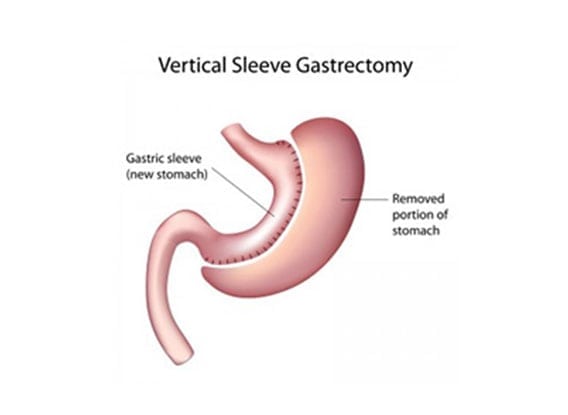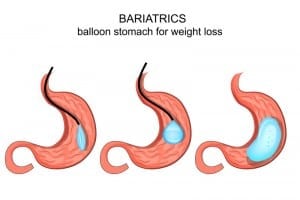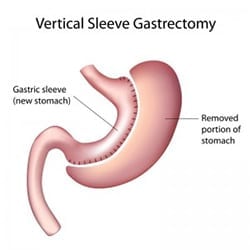
Stomach Surgery can be your new beginning of a healthy lifestyle.
No one intentionally decides to be overweight, but obesity is a condition that many people cannot resolve without medical assistance. Stomach surgery for weight loss, also known as bariatric surgery, may seem like a last resort to losing extra pounds and body mass, but can actually prove to the beginning of a new, manageable, healthy lifestyle. Stomach surgery for weight loss can be beneficial for individuals with contributing health conditions such as:
- Type 2 diabetes
- Heart issues and high blood pressure
- Sleep apnea
To learn more about the different types of weight loss surgery and whether or not you could benefit from a surgical procedure, contact our office today to schedule a consultation with our top surgeon.
The three most typical forms of bariatric surgery include adjustable Lap-Band, gastric bypass, and vertical sleeve gastrectomy. Determining which weight loss procedure is optimal for someone will depend on an extensive examination and analysis by a bariatric specialist to see if the patient meets the criteria for stomach surgery, the patient’s individual medical condition, and the patient’s willingness to follow through with lifestyle changes after the surgery. Understanding how each procedure will be performed, how long each surgery will take, the estimated recovery time in the hospital, and the benefits that can result will help will aid the patient in the decision process.
TYPES OF STOMACH SURGERY FOR WEIGHT LOSS
Adjustable Lap-Band
 This is a minimally invasive procedure that is performed laparoscopically to reduce the amount of visible scars. The patient is given a general anesthetic and will be asleep during the surgery. A special saline-filled band is positioned around the upper part of the stomach to divide the organ into two parts. If the surgery is done as an outpatient procedure, the patient may be able to go home a few hours after recovery. If performed as a regular form of surgery, the patient may need an overnight stay in the hospital. The Lap-Band process has a faster recovery time than other forms of stomach surgery. The constricting effect of the band will need to be professionally examined and adjusted, without any further surgery, every 6 to 8 weeks. The desired effect of lap-banding is that food will go to the upper, smaller part of the stomach above the band and the patient will feel full faster than before the surgery. The food then slowly passes through the lower stomach area and will be digested normally.
This is a minimally invasive procedure that is performed laparoscopically to reduce the amount of visible scars. The patient is given a general anesthetic and will be asleep during the surgery. A special saline-filled band is positioned around the upper part of the stomach to divide the organ into two parts. If the surgery is done as an outpatient procedure, the patient may be able to go home a few hours after recovery. If performed as a regular form of surgery, the patient may need an overnight stay in the hospital. The Lap-Band process has a faster recovery time than other forms of stomach surgery. The constricting effect of the band will need to be professionally examined and adjusted, without any further surgery, every 6 to 8 weeks. The desired effect of lap-banding is that food will go to the upper, smaller part of the stomach above the band and the patient will feel full faster than before the surgery. The food then slowly passes through the lower stomach area and will be digested normally.
Gastric Bypass
 For most patients, gastric bypass is performed as a minimally invasive laparoscopic surgery, which means little to no scarring. If a patient has a medical condition that would preclude a laparoscopic operation, the surgeon can perform an open surgery. This means that the patient will have a small scar after surgery.
For most patients, gastric bypass is performed as a minimally invasive laparoscopic surgery, which means little to no scarring. If a patient has a medical condition that would preclude a laparoscopic operation, the surgeon can perform an open surgery. This means that the patient will have a small scar after surgery.
Before the operation, the patient is given a general anesthetic and will sleep through the surgery. During the procedure, a small upper stomach pouch is formed by dividing the entire stomach area into two parts. A portion of the small intestine of the upper bowel is attached to the stomach pouch. Depending on the patient’s needs after surgery, there may be a one or two-night hospital stay required. The desired result of gastric bypass is that food will bypass a part of the intestine and less calories are absorbed from the food eaten. Another benefit from having a smaller stomach pouch is that less food is required before the patient feels full and weight loss can be easier to achieve. Blood tests will be routinely done to ensure that no vitamin or mineral deficiencies develop due to the bypass process. If this happens, the patient will be given beneficial supplements.
Vertical Sleeve Gastrectomy
 This procedure is a minimally invasive laparoscopic surgery. Vertical sleeve gastrectomy is also known as a restrictive procedure because after surgery, the patient’s stomach will only be able to tolerate a limited amount of food. This process is advantageous for very obese individuals due to the ability to lose weight faster than with other procedures.
This procedure is a minimally invasive laparoscopic surgery. Vertical sleeve gastrectomy is also known as a restrictive procedure because after surgery, the patient’s stomach will only be able to tolerate a limited amount of food. This process is advantageous for very obese individuals due to the ability to lose weight faster than with other procedures.
Before the procedure, the patient is given a general anesthetic and will remain asleep throughout the operation. During a gastrectomy, the surgeon removes the left side of the stomach and implants a banana shaped sleeve in the vacant space. The goal of this procedure is to remove that part of the stomach that produces the hormone ghrelin, which stimulates the hunger sensation. After surgery, and depending on the patient’s medical concerns, there may be a short hospital stay required. While the stomach will function normally after a gastrectomy, it will be smaller and the patient will feel fuller faster. Another benefit of this surgery is that the patient will be able to eat most of the foods eaten prior to the operation, but in much smaller amounts. Foods are absorbed and processed normally. Weight loss following this procedure is slower and steadier than with other bariatric surgeries.
There are other variations of weight loss surgery, and the type that is best for you will depend on many factors. During your consultation, your doctor will work with you to determine the weight loss method that fits best with you.
POST-OPERATIVE CARE:
 As with all forms of surgery, the surgeon will provide the patient with post-operative instructions that will include when it will be okay to return to work, when to resume normal activities, if there are any eating restrictions, recommendations for starting and maintaining an exercise routine, and a schedule for follow up office visits and any required medical tests.
As with all forms of surgery, the surgeon will provide the patient with post-operative instructions that will include when it will be okay to return to work, when to resume normal activities, if there are any eating restrictions, recommendations for starting and maintaining an exercise routine, and a schedule for follow up office visits and any required medical tests.
The instructions that you receive following your stomach surgery will be specific to your care. This is because each patient is different and has a different health history, medical needs, and lifestyle and weight loss goals. To best reach your goals and to make sure that you recover safely, it is very important to follow all of the instructions from your doctor very carefully.
To learn more about different types of weight loss surgery and to explore your options, contact our office today for a consultation.







